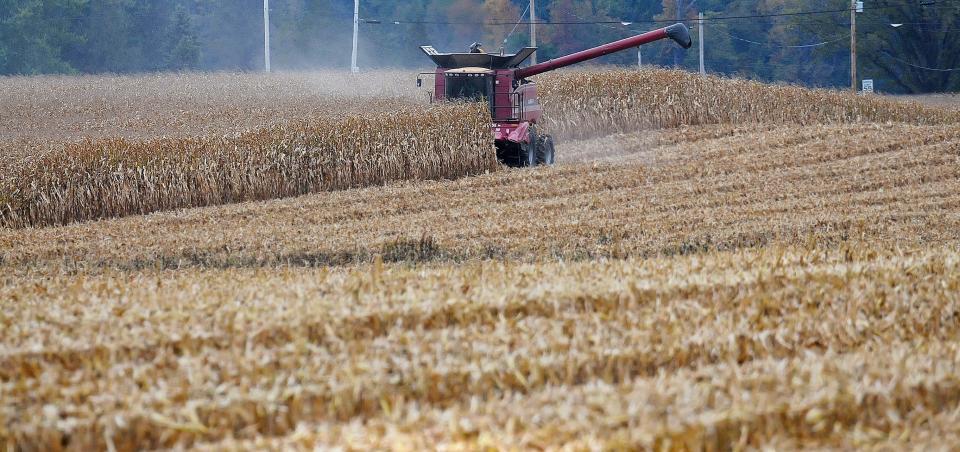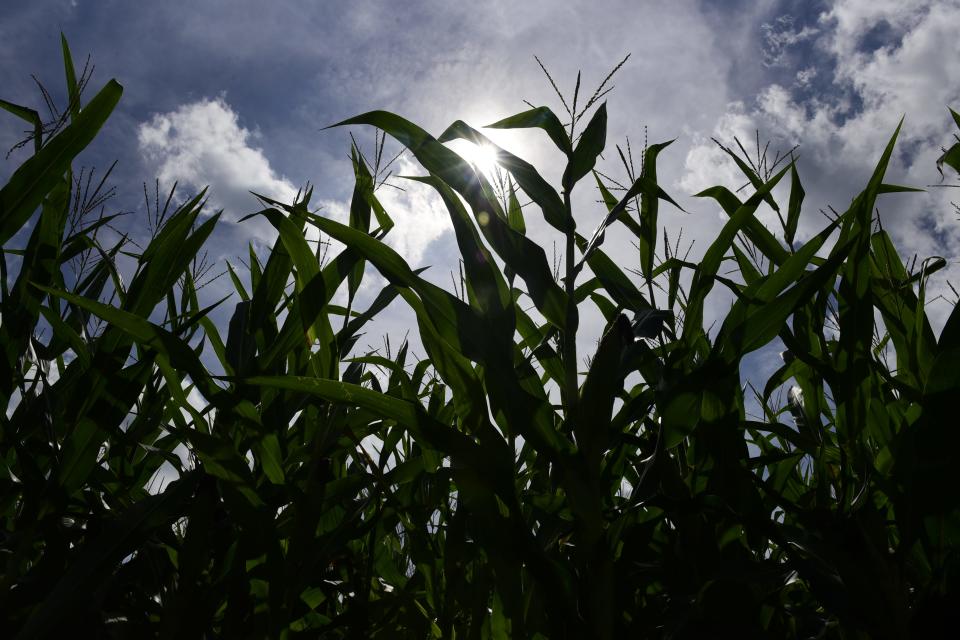Ohio farmers concerned what Mexico's GMO corn ban means for the future

As snow swirled over the soil hundreds of acres in each direction, Owen Niese already was worried about a crop that hadn't even been planted.
He was concerned because Mexico's president, Andrés Obrador, decided this winter to ban genetically modified corn, a staple crop not just for Niese, but for farmers across northern Ohio.
Mexico is the second-largest buyer of U.S. corn, just behind China. Ohio is a top 10 corn-producing state.
The ban came about four months after Niese, like most farmers, already had purchased 2023 seed corn.
"They want to deliver it now, because I need to plant it in a month," Niese said. "So for this year, it's impossible to get non-GMO seed and produce a non-GMO crop."
More:Biofuels a growing part of Ohio agriculture
Mexico's corn ban 'is very political'
Obrador's corn ban is not just financially troubling for farmers, but also is a direct violation of an international treaty, according to Tadd Nicholson, executive director of Ohio Corn & Wheat Growers Association.
The organization advocates public policy on behalf of nearly 2,000 member farms from across the Buckeye State.
Nicholson explained the United States, Mexico and Canada all agreed to the U.S.-Mexico-Canada Agreement (USMCA) in 2020, replacing the North American Free Trade Agreement (NAFTA) after 26 years.
Treaty issues and inquiries were transitioned Feb. 12 to the Textiles and Trade Agreements Division of the U.S. Customs and Border Protection, according to the customs website, cbp.gov.
By signing the treaty, the heads of the three largest North American nations "committed to basing their regulation on scientific research," according to a March 6, 2023, New York Times article.
The Times reported "that Mexico’s ban on genetically modified corn did not conform to those promises."
Ohio's top corn-growing advocate agrees, adding Obrador has chosen politics over science.
"He is ignoring the sound science that says, by every health organization in the world that has tested this, that it is safe for consumption of both humans and animals," Nicholson said. "So it's very political."
'Our research dollars are invested in GMO'
Niese grew up on his family's farm in northern Richland County. Like his father and grandfather before him, he grows yellow corn and soybeans.
"We're a multigeneration farm," Niese said.
Over the decades, their farm practices have been tailored to match their crops, which are grown from genetically modified seed.
"All of our research dollars are invested in GMO corn," Niese said.

That means scientists selecting genetic traits to produce plants that are more resistant to diseases and drought, allowing farmers to harvest as many bushels per acre as possible.
"It's hundreds of years of selective breeding," Niese said. "To feed all the other countries we need to feed, we need those yields."
It's not just corn, either. Soybeans also have improved over the decades through genetic modification.
'You'd have food insecurity'
Switching to non-GMO crop production would require extensive changes at Niese Farms.
The first step would be finding seed that would provide as good of a yield as genetically modified seed. That would be a hard task.
"I hear 25% yield decrease in non-GMO versus GMO," Niese said. "There's so many variables in that."
Since the crops sell at the same rate per bushel, less yield would mean less income to pay for tractors, fertilizer, herbicide, fuel, insurance and myriad other expenses. That alone could make many farms go broke.

Those higher expected yields in GMO crops are for healthy fields before factoring in all the risks that face the plants throughout the growing season.
"It's tolerant to some insects," Niese said of GMO seed. "It's tolerant to some soil-borne diseases, and then it's obviously tolerant to herbicides."
And if every farm in the world was forced to switch to non-GMO seed?
"I think you'd have food insecurity," Niese said.
GMO crops need fewer inputs and are more efficient
Farmers shouldn't even have to think about those possibilities, though, the head of Ohio's corn growers association said.
"It's such an outlandish thing to even contemplate," Nicholson said.
The United States, Argentina and Brazil, he said, are the world's largest corn-producers, and they "are fully committed to the safety" of genetically modified crops.
Their strategy is in place not just to feed a growing world population, but also to "farm in a more sustainable way."
"It helps us to reduce the pesticides that we use and any kind of crop inputs," Nicholson said. "It helps us solve so many problems and makes us so much more efficient."
Asking U.S. lawmakers to pressure Mexico into compliance
Rumors on the ban started circulating through the farming community just a few weeks before Christmas.
A month later, the ban was in full force, prohibiting GMO corn of all types. By February, Mexico relaxed some of its restrictions so some yellow corn for animal consumption could be brought into the country.

In Ohio, the corn growers association has an alert covering its website's homepage: "Call on congress to act now and protect Ohio farmers!"
Lawmakers and farmers in the United States are still hoping for the ban to be lifted entirely.
Users can click a link from the message that takes them to a form they can sign and send to their elected officials.
"We're asking our congressional members to put pressure on the administration," Nicholson said.
Concerned residents can call their elected officials. If there's enough outcry, the next step could be sanctions against Mexico.
"The rules in USMCA, and any trade agreement that we sign, are very important to us," Nicholson said. "We just can't allow one political move to, you know, undo it."
ztuggle@gannett.com
419-564-3508
Twitter: @zachtuggle
This article originally appeared on Mansfield News Journal: Ohio farmers concerned what Mexico's GMO corn ban means for the future

